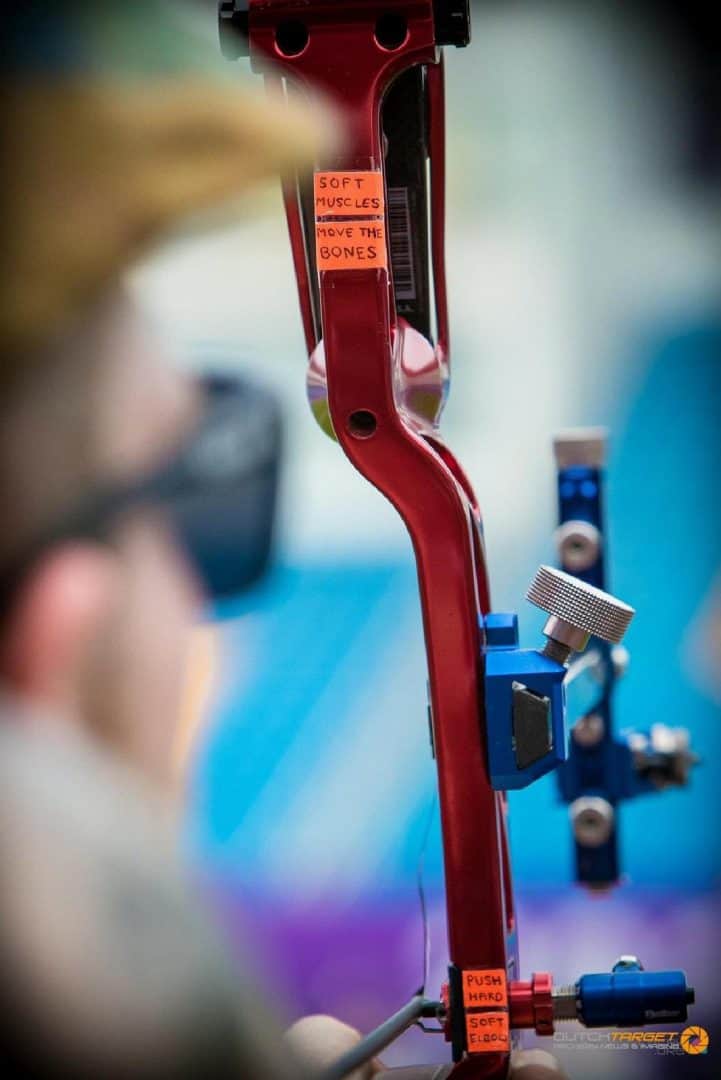How do you stay focused during archery? Patrick Huston explains different ways to stay focused and enjoy archery through practice and competition.

Archery is a sport of repetition. Whether that is repetition shot by shot, end by end or throughout a whole competition or even a season. This means that we need to keep ourselves focused on the task in hand so that we achieve the results, technique and shooting that we desire.
Hopefully, in this short piece, I can give you some practical examples of tactics to try and improve your focus through a shooting session.
The first thing that I am going to mention is hydration. The body of a human being comprises a huge amount of water. If our hydration levels drop, our focus drops. Drink lots of water. If you think you drink enough water, drink more. If you don't think you drink a lot of water, drink lots more water.
The brain is one of the first things to suffer during dehydration, followed closely by the eyes. If you want to remain focussed in your shooting, keep these vital tools well serviced with fluids! This is particularly poignant as tournament days and even shooting sessions down at the club can last a long period of time.
Personally, I would recommend buying a HUGE water bottle, mine is nicknamed the Gallon-Flagon, as this means your supplies will not dwindle too quickly. More is better, keep drinking.
The next thing that I would recommend is to have a purpose in each shooting session. It is easy to go down to the club and pick up your bow and start shooting without any specific purpose to the activity apart from shooting some arrows.
Whether it comes from a defined and written plan, or you simply decide on the day what element of your archery you want to work on, having something specific to focus on will help you stay focussed. Some examples of what you could direct your attention to shot timing (either during the shot or between shots, both are applicable and relevant), gauging the wind using a variety of indicators (try predicting the ebbs and flow more than the amount it will move). String alignment, breathing pattern, relaxation in your drawing arm, direction and maintenance of follow-through, plotting your arrows and keeping the group centred.
Choosing one of these elements, or any which suit your current position will give you a specific purpose and function of your time at the range. This makes your shooting time more valuable and gives you something specific to focus on rather than just shooting well or your technique in general.
Now perhaps the most practical things I would recommend: stick notes to things to remind you! For a very long time I had ‘soft muscles, move the bones' on a small piece of fluorescent paper stuck to the top of my riser.
Courtesy of World Archery
I have also drawn on my hands to remind me of specific elements of my technique more times than I care to imagine. As many people have seen, I have also put more detailed notes attached to my scope. This can be as brief as a couple of pointers, or as detailed as your entire shot routine and notes.
These notes seek to jog the memory regularly to keep certain elements at the forefront of your brain which makes whichever element a more conscious process. I recommend that you change the note, even if it is replaced with the same words, every few weeks. This keeps it being ‘seen' by the subconscious and directing your attention towards it.  Hence why my ‘soft muscles' is in fluorescent orange, it attracts attention.
If there are specific technical elements you are focussing on, and particularly in any double detail shooting, use your time behind the line wisely. I recommend (first off sticking a note on your chair to remind you) to do mental rehearsal emphasising whichever element you are working on.
I recommend visualising from your own perspective, not as if you are watching yourself. This makes the rehearsal more realistic and more applicable to the development of the skill you are seeking to improve. Mental rehearsal can be an incredibly powerful tool, even capable of making changes without you physically doing the action.
For example one of my mentors is a GB Olympic medalist Javelin Thrower who realised some crucial piece of technique at the last practice before a major international. She didn't have another chance to throw before the event but mentally rehearsed the throw time and time again. When it came to the event that small change in her technique was automated and she performed brilliantly.
My final piece of advice is to enjoy your shooting. Particularly in these times, it is very easy to stress over things and become unnecessarily anxious about minutiae. Keep your desire to improve in archery in perspective and recognise that while other things are out of your control that you may try to overcompensate and become stressed about the small details of your shooting.
Make sure to have fun with your sport and to change up your practice (this is crucial to ease development and reduce plateaus which can happen if you stick with one distance) and to appreciate that we have a sport which we are able to do. Progression and improvement in archery are obviously aided by focus and attention, but if that turns into stress and beating yourself up then your enjoyment of the sport will suffer, and likely so will your shooting
